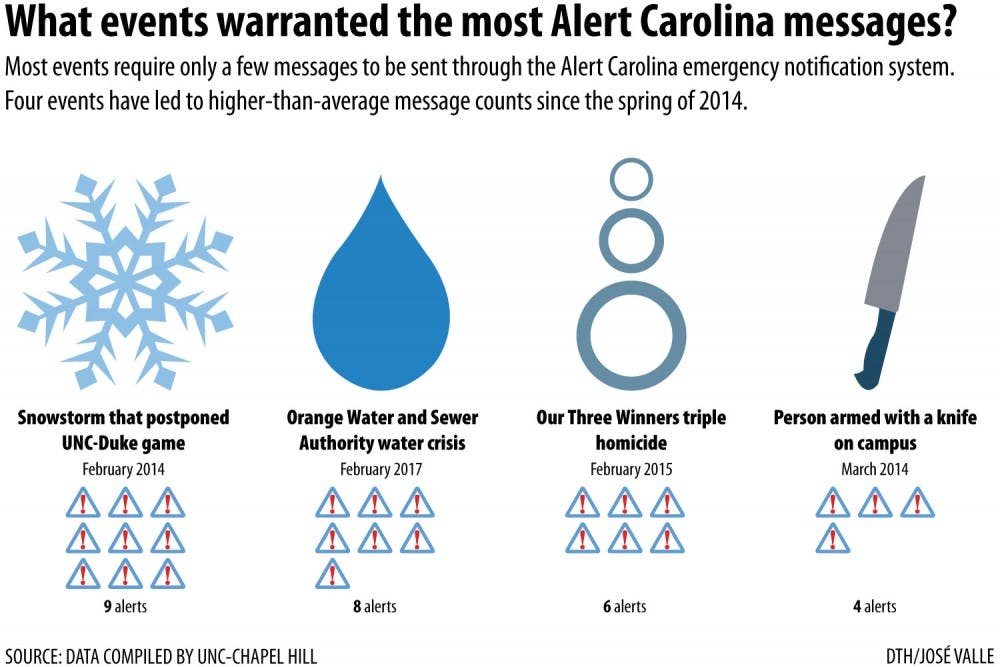He said it’s also important to not overuse an emergency alerts system.
“We get a lot of people who begin to ignore the system if it’s overused,” Dorn said. “If students do get the alert, they don’t look at it. They figure, ‘This is the same alert I’ve seen…’”
Senior Pranavi Sanka said she pays attention if she gets an Alert Carolina message.
“I do pay attention when I get a text message,” Sanka said. “I probably get them like once or twice a month. (Wednesday), I got three because of the alarms, but that’s rare to get so many within the same day.”
Senior Joey Avioli said the emails and texts sent with Wednesday's siren test were irritating to him.
“I got like four (Wednesday) morning,” Avioli said. “They could chill on the sirens, honestly.”
Dorn said alerting campuses when drills are going on is more important than many people realize.
“We had a case in Nigeria where they decided to do an unannounced drill of an active shooter on campus, and so here they thought, ‘We have these new announcement systems,’ and they didn’t tell anyone they were doing it,” Dorn said. “People jumped out of windows, and one man died.”
He said similar things have happened elsewhere when system tests weren’t well publicized.
During the summer of 2016, UNC streamlined its system from separate message and siren activations to the One Button alert system.
"It took up to 15 minutes to activate all of these methods of communication," Young said. "We've reduced that down to a three-minute activation. We've expedited the process of this multi-level communication."
He said Alert Carolina has evolved over the past several yeas.
To get the day's news and headlines in your inbox each morning, sign up for our email newsletters.
"The way we sent out messages five years ago may seem outdated now," Young said.
He said he's proud of DPS's integration of social media into the alerts system.
"When we send out a message, it automatically posts to the website, app, Facebook and Twitter," Young said. "Those are paramount now because people choose to receive their information through social media now. That's why we need to keep studying and to keep testing our system and to find new ways to communicate in more efficient ways."
Kyle Cavanaugh, the vice president for administration at Duke University, said decisions about sending messages through the DukeALERT system are made on a case-by-case basis.
“Every situation is slightly different,” Cavanaugh said. “In the majority of our practices, we send both (text and email), because we want to have some level of redundancy in the system."
He said it’s a challenge to decide which off-campus incidents should require alerts, and which should not. He said Duke usually doesn’t send alerts for incidents that don’t happen on campus.
“You get into definitional issues for what is off-campus,” Cavanaugh said. “Every school is required, which I know (UNC) is, to define specific areas that fall under legal governance structures. But then there are occasions where it doesn’t fit the definition, but you feel there is an imminent risk to the institution — so we have to make those judgment calls on occasion.”
From the spring semester of 2014 to fall 2016, a total of 223 alerts were sent out through the Alert Carolina system. Of those, 20 dealt with off-campus incidents, and only two off-campus alerts were sent via text.
Cavanaugh said it’s hard to walk the line of sending alerts when they’re warranted and not bombarding the university community.
“I think you always have to give consideration to that, so that people won’t start dismissing them,” he said. “But you also have to look at how frequently these events occur. You’re really dictated by the event itself. That’s always the concern about being oversaturating.”
Young said DPS takes similar factors into consideration.
"For example, over the Christmas break, there were a number of residence hall rooms that were broken into and nothing was taken," Young said. "We decided not to send text messages to 19,000 students who were home for Christmas break. We meet Clery compliance, but don't necessarily put out a text message."
He said DPS is always looking for ways to improve Alert Carolina.
“I think by and large, it’s a system that is very effective,” Young said. “However, it is under consistent and constant review.”
enterprise@dailytarheel.com



